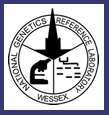Project leader: Dr Helen White
Background
NGRL (Wessex) are part of a team of researchers involved in RAPID (Reliable Accurate Prenatal non-Invasive Diagnosis) - a 5 year UK national programme funded by the National Institute for Health Research. The aim of the research programme is to improve the quality of NHS prenatal diagnostic services by evaluating early non-invasive prenatal diagnosis (NIPD) based on cell free fetal (cff) DNA and RNA in maternal plasma. The role of NGRL (Wessex) is to develop NIPD for aneuploidy and take part in laboratory assessments and development of quality control material for NIPD of fetal sex and single gene disorders.
Developing NIPD for aneuploidy
Currently, in the UK, prenatal screening for aneuploidy is offered to all pregnant women and is undertaken in two phases: screening and risk assessment followed by invasive prenatal diagnosis of high risk cases. The gold standard for diagnosis of chromosomal abnormalities is karyotyping of fetal cells obtained via invasive procedures; chorionic villus sampling (CVS) and amniocentesis. However, due to a small but significant risk to the pregnancy, many women are reluctant to opt for these procedures. In 2006-7, ~700,000 pregnant women a year underwent antenatal screening and 20,000 amniocentesis and 5,200 CVS were performed with an estimated associated procedural related pregnancy loss of ~250.
Cell free fetal (cff) DNA and RNA in the maternal circulation offer an alternative source of fetal genetic material upon which to base NIPD of aneuploidy. The development of safe, reliable and accurate NIPD for Down Syndrome (DS) has the potential to reduce this risk of miscarriage and allow earlier detection of DS. Several non-invasive tests for detection of DS are currently undergoing development including:
- Analysis of SNP allele ratios from cffRNA chromosome 21 transcripts using MALDI-TOF mass spectrometry 1 and digital PCR.2
- Massively parallel whole genome sequencing of total maternal cell free plasma DNA 3,4.
- Analysis of fetal specific epigenetic markers.5,6
- Relative chromosome dosage by digital PCR.2
We will be undertaking studies to assess the analytical and clinical validity of tests for the non-invasive detection of DS (and trisomy 13 & 18) focusing initially on the analysis of SNP allele ratios using MALDI-TOF mass spectrometry, methodologies using digital PCR and the development of targetted massively parallel whole genome sequencing assays. Maternal blood samples and cultured fetal cells are currently being collected from women undergoing invasive testing in London and the Wessex region. cffDNA and cffRNA extracted from maternal plasma will be used for analysis of the various NIPD tests and the cultured fetal cells will be used to confirm the NIPD result allowing the sensitivity and specificity of each assay to be determined.
RAPID team
Lyn Chitty, Institute of Child Health, Principal Investigator
Doug Altman, Centre for Statistics, Oxford
Neil Avent, Plymouth
Hilary Burton , PHG Foundation, Cambridge
John Crolla, Wessex Regional Genetics Laboratory
Peter Farndon, National Genetics Education and Development Centre
Alastair Kent, GIG
Steve Morris, UCL
Ainsley Newson, Bristol University
Gail Norbury, London
Peter Soothill, St Michaels Hospital, Bristol
Helen White, NGRL Salisbury
Jacquie Westwood, Commissioning
Further information
If you would like to find out more about the NGRL (Wessex) NIPD work programme please contract Dr Helen White (hew@soton.ac.uk) Tel: 01722 429080
For information on RAPID please see www.rapid.nhs.uk or contact the RAPID team administrator: rapid@ich.ucl.ac.uk.
Selected publications
- Lo YM, Tsui NBY, Chui RWK et al. Plasma placental RNA allelic ratio permits non-invasive prenatal chromosomal aneuploidy detection. Nature Medicine 2007, 13:218-223
- Lo YM, Lun FM, Chan KC, Tsui NB, Chong KC, Lau TK, Leung TY, Zee BC, Cantor CR, Chiu RW. Digital PCR for the molecular detection of fetal chromosomal aneuploidy. Proc Natl Acad Sci U S A. 2007 Aug 7;104(32):13116-21
- Fan HC, Blemenfeld YJ, Hudgins L et al. Noninvasive diagnosis of fetal aneuploidy by shotgun sequencing DNA from maternal blood. Proc Natl Acad Sci U S A. 2008;105(42):16266-71.
- Chiu RW, Chan KC, Gao Y, Lau VY, Zheng W, Leung TY, Foo CH, Xie B, Tsui NB, Lun FM, Zee BC, Lau TK, Cantor CR, Lo YM. Noninvasive prenatal diagnosis of fetal chromosomal aneuploidy by massively parallel genomic sequencing of DNA in maternal plasma. Proc Natl Acad Sci U S A. 2008 105(51):20458-63
- Chim SS, Jin S, Lee TY, Lun FM, Lee WS, Chan LY, Jin Y, Yang N, Tong YK, Leung TY, Lau TK, Ding C, Chiu RW, Lo YM. Systematic search for placental DNA-methylation markers on chromosome 21: toward a maternal plasma-based epigenetic test for fetal trisomy 21 Clin Chem. 2008 Mar;54(3):500-11
- Papageorgiou EA, Fiegler H, Rakyan V, Beck S, Hulten M, Lamnissou K, Carter NP, Patsalis PC. Sites of differential DNA methylation between placenta and peripheral blood: molecular markers for noninvasive prenatal diagnosis of aneuploidies. Am J Pathol. 2009 May;174(5):1609-18. Epub 2009 Apr 6.
Lo YMD. Noninvasive prenatal detection of fetal chromosomal aneuploidies by maternal plasma nucleic acid analysis: a review of the current state of the art. BJOG. 2009 Jan;116(2):152-7. Review.
|
